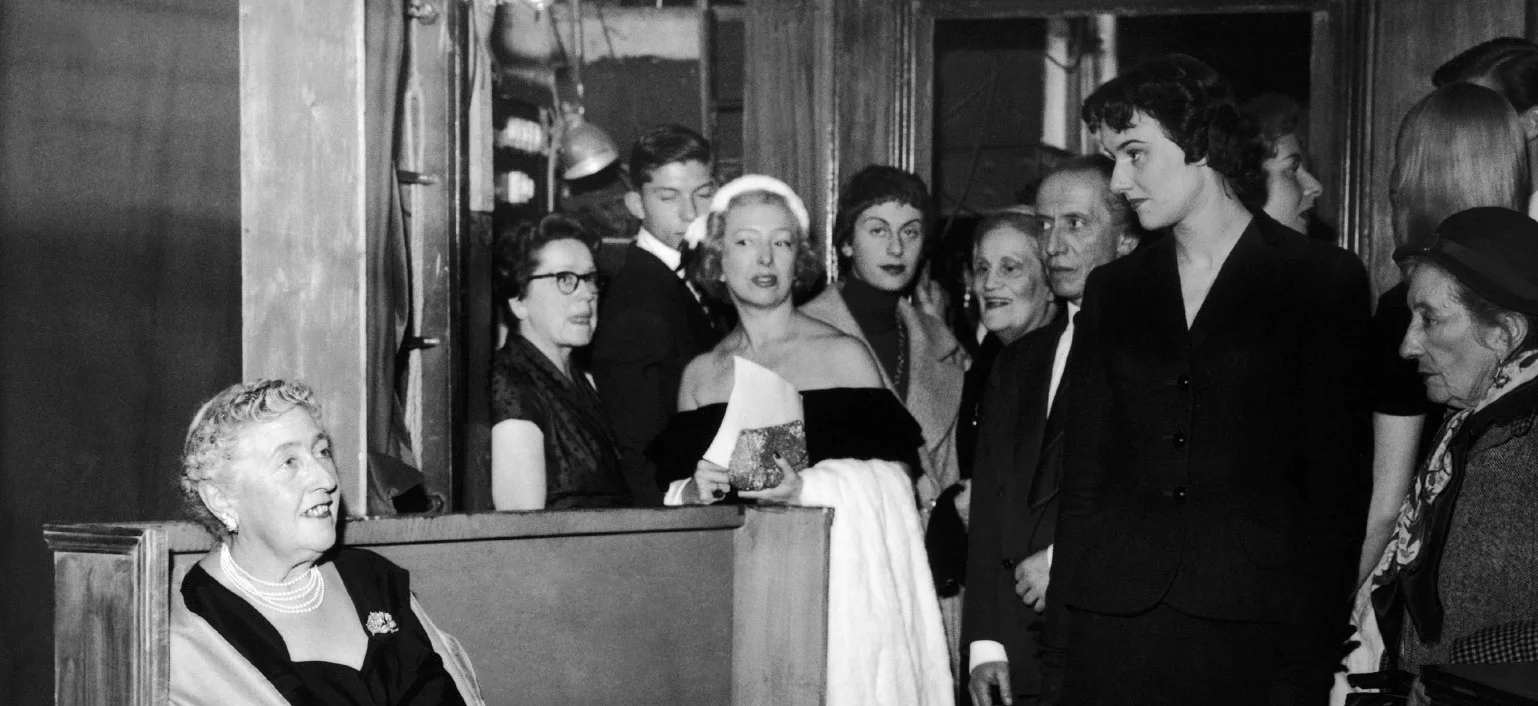
Agatha Christie in Paris to attend the presentation of her play ''Witness for the Prosecution'', at the Edward VII Theatre.1955/Getty Images
The first lady of crime fiction has lived an extraordinarily happy life because she chose to be happy, regardless of the circumstances.
Over the course of her literary and other work, Agatha Christie wrote many novels, short stories, and plays, becoming one of the most famous writers of mysteries in the world. That’s no joke—she’s been published more than 4 billion times in 100 languages worldwide!
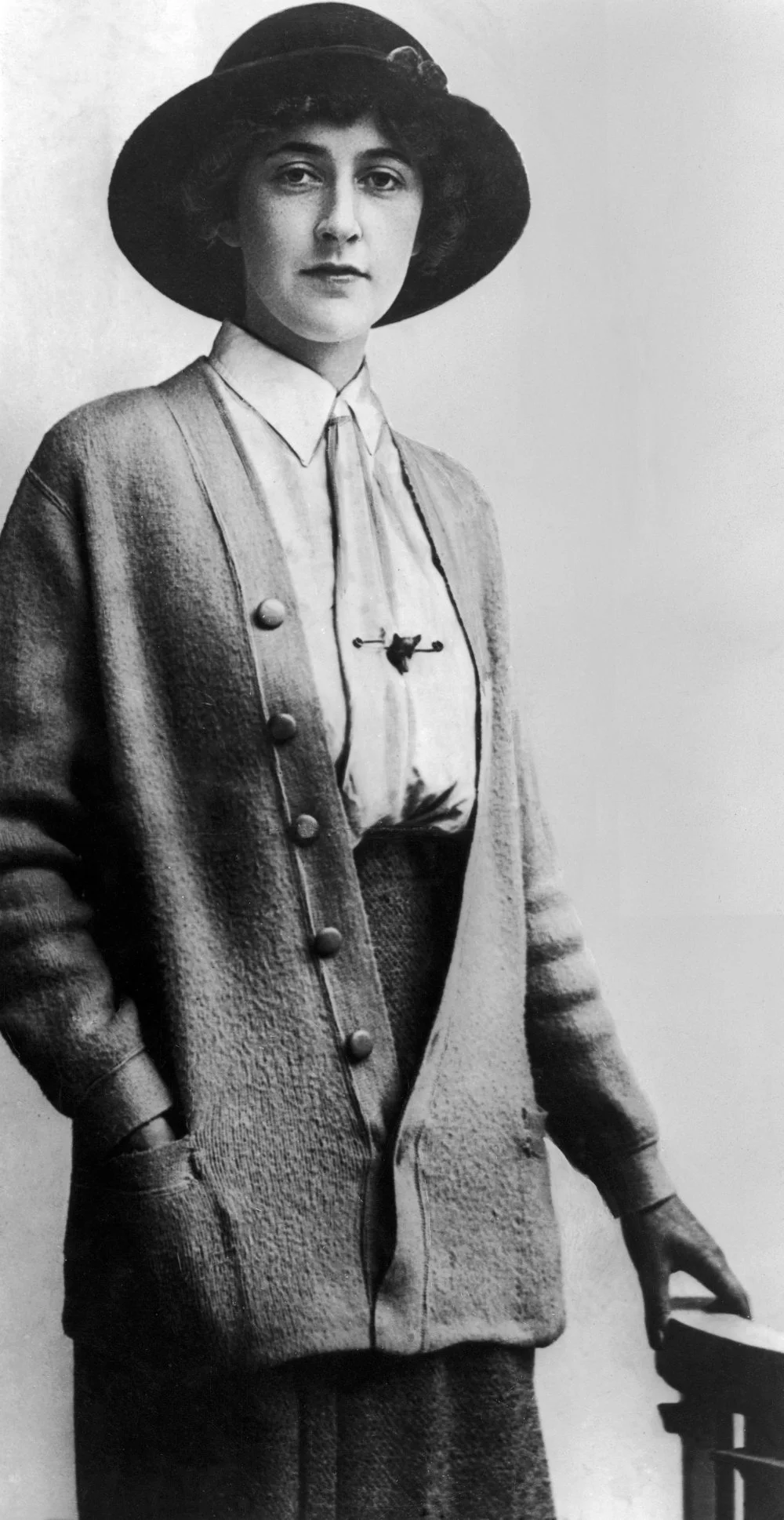
Agatha Christie. 1915/Alamy
Born Agatha Miller, she was born and raised in typical Victorian fashion. However, she lived through three quarters of the turbulent twentieth century, a time when everything—not only technology and fashion, but morals and mores as well—was changing rapidly. Not everyone was able to understand and accept these changes, but Agatha, one of the smartest women of her time, did. She survived the bankruptcy of her parents, the loss of loved ones, two World Wars (both of her husbands were at the front, and she worked as a pharmacist in hospitals during the wars) and remained an infinitely sensible, cheerful person. What were the principles that helped her maintain her positive outlook and sanity during these challenging times?
On the Past
‘Life seems to me to consist of three parts: the absorbing and usually enjoyable present which rushes on from minute to minute with fatal speed; the future, dim and uncertain, for which one can make any number of interesting plans, the wilder and more improbable the better, since—as nothing will turn out as you expect it to do—you might as well have the fun of planning anyway; and thirdly, the past, the memories and realities that are the bedrock of one’s present life, brought back suddenly by a scent, the shape of a hill, an old song—some triviality that makes one suddenly say “I remember…” with a peculiar and quite unexplainable pleasure.
This is one of the compensations that age brings, and certainly a very enjoyable one—to remember.’
On Children
The Victorians looked dispassionately at their offspring and made up their minds about their capacities. A. was obviously going to be “the pretty one”. B. was “the clever one”. C. was going to be plain and was definitely not intellectual. Good works would be C.’s best chance. And so on. Sometimes, of course, they were wrong, but on the whole it worked. There is an enormous relief in not being expected to produce something that you haven’t got.’
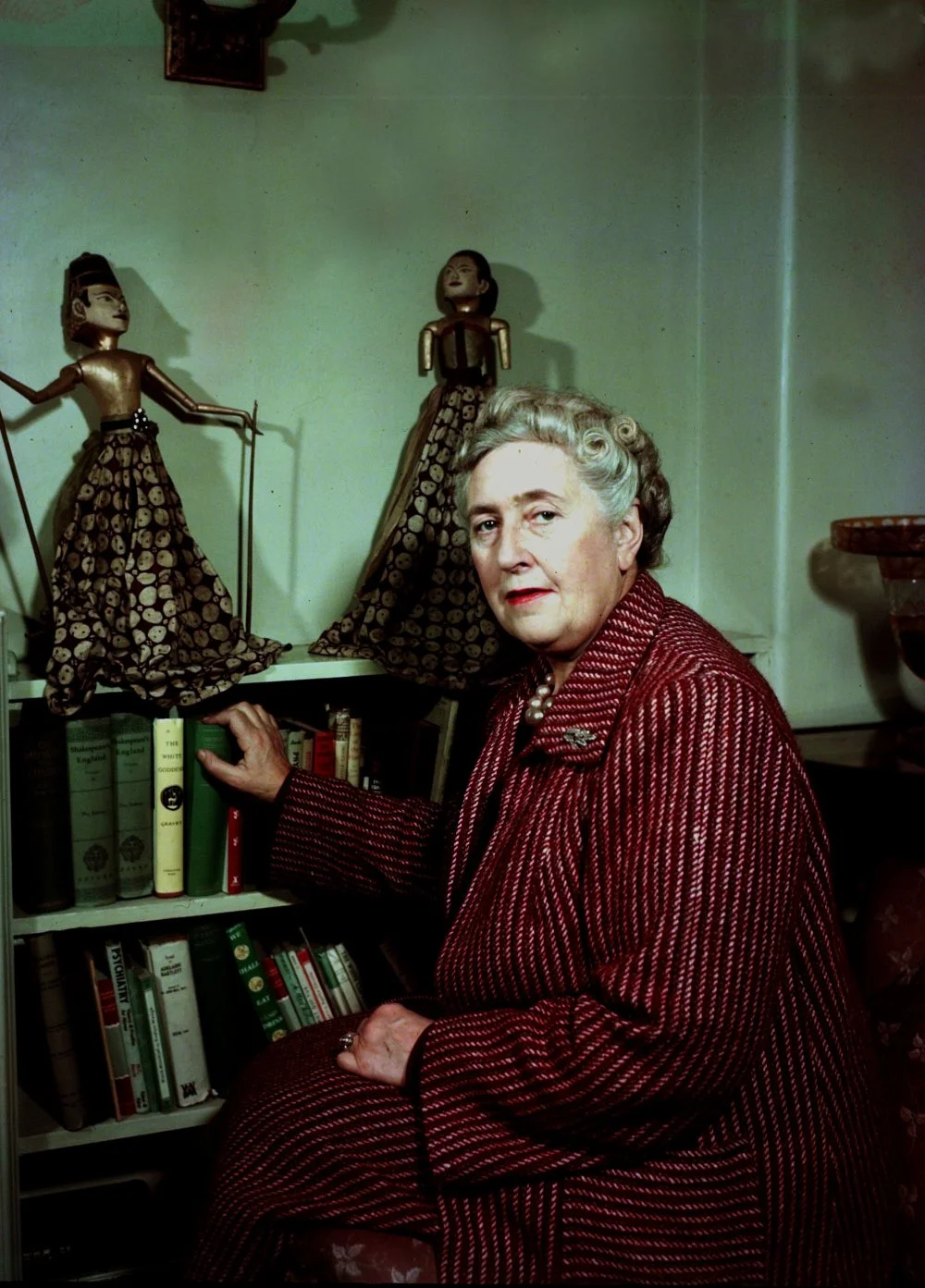
Agatha Christie/Getty Images
The Victorians looked dispassionately at their offspring and made up their minds about their capacities. A. was obviously going to be “the pretty one”. B. was “the clever one”. C. was going to be plain and was definitely not intellectual. Good works would be C.’s best chance. And so on. Sometimes, of course, they were wrong, but on the whole it worked. There is an enormous relief in not being expected to produce something that you haven’t got.’
On Being Young
‘We were like obstreperous flowers—often weeds maybe, but nevertheless all of us growing exuberantly—pressing violently up through cracks in pavements and flagstones, and in the most inauspicious places, determined to have our fill of life and enjoy ourselves, bursting out into the sunlight, until someone came and trod on us. Even bruised for a time, we would soon lift a head again.
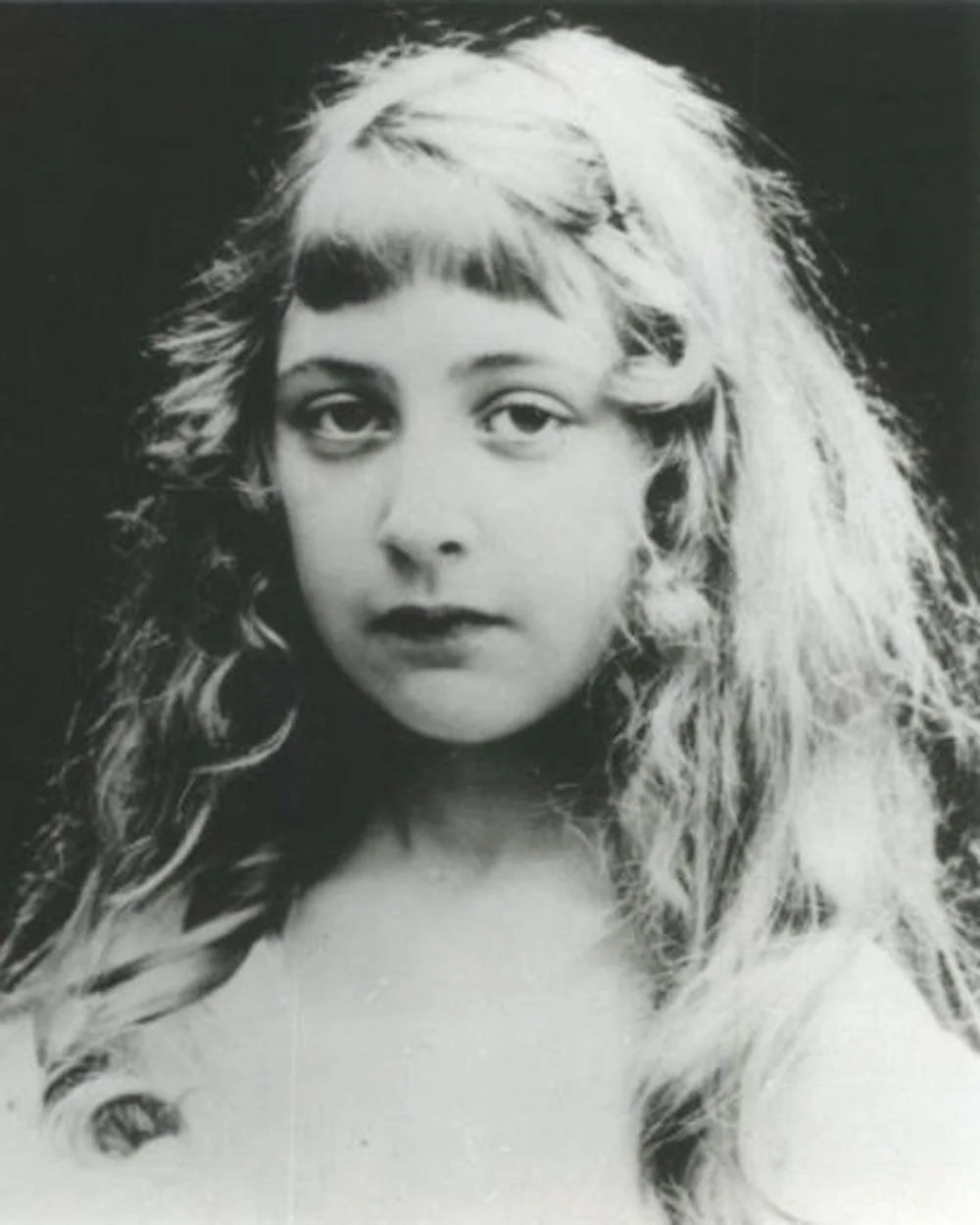
Agatha Christie as a child/Alamy
Nowadays, alas, life seems to apply weed killer (selective!)—we have no chance to raise a head again. There are said to be those who are “unfit for living”. No one would ever have told us we were unfit for living. If they had, we shouldn’t have believed it. Only a murderer was unfit for living.
On Love
‘It is a curious thought, but it is only when you see people looking ridiculous, that you realise just how much you love them! Anyone can admire somebody for being handsome or amusing or charming, but that bubble is soon pricked when a trace of ridicule comes in. I should give as my advice to any girl about to get married: “Well now, just imagine he had a terrible cold in his head, speaking through his nose all full of b’s and d’s, sneezing, eyes watering.
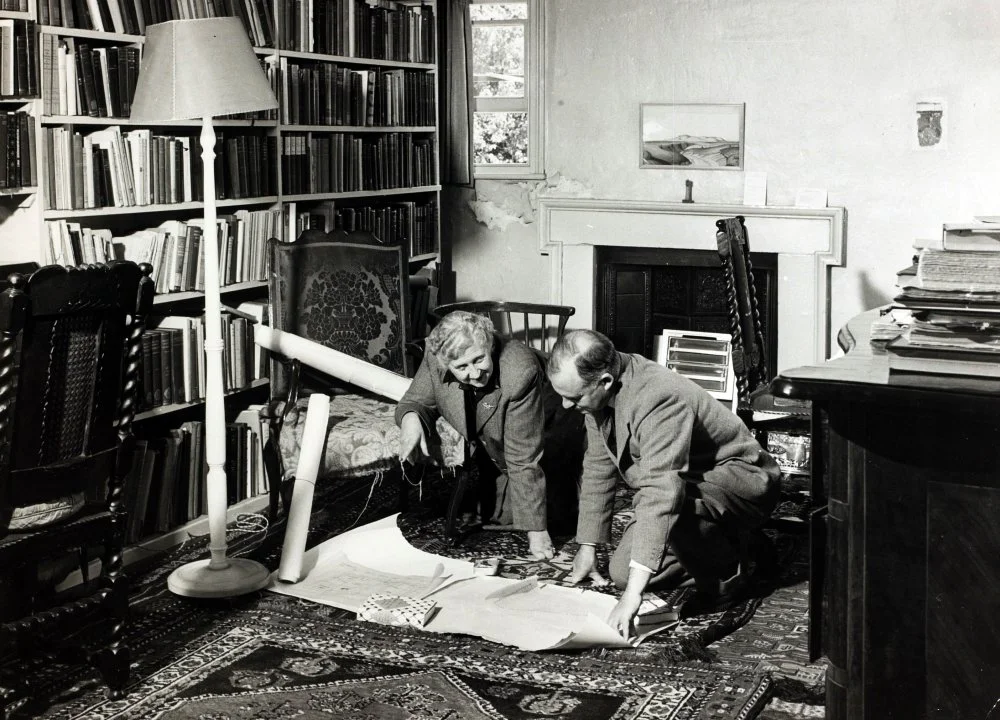
Agatha Christie pictured with her husband Prof, Max Mallowan/Getty Images
What would you feel about him?” It’s a good test, really. What one needs to feel for a husband, I think, is the love that is tenderness, that comprises affection, that will take colds in the head and little mannerisms all in its stride.’
On Laziness
‘I don’t think necessity is the mother of invention—invention, in my opinion, arises directly from idleness, possibly also from laziness. To save oneself trouble. That is the big secret that has brought us down the ages hundreds of thousands of years, from chipping flints to switching on the washing up machine.’
On Pleasure
‘It is astonishing how much you can enjoy almost everything. There are few things more desirable than to be an acceptor and an enjoyer. You can like and enjoy almost any kind of food or way of life. You can enjoy country life, dogs, muddy walks; towns, noise, people, clatter.
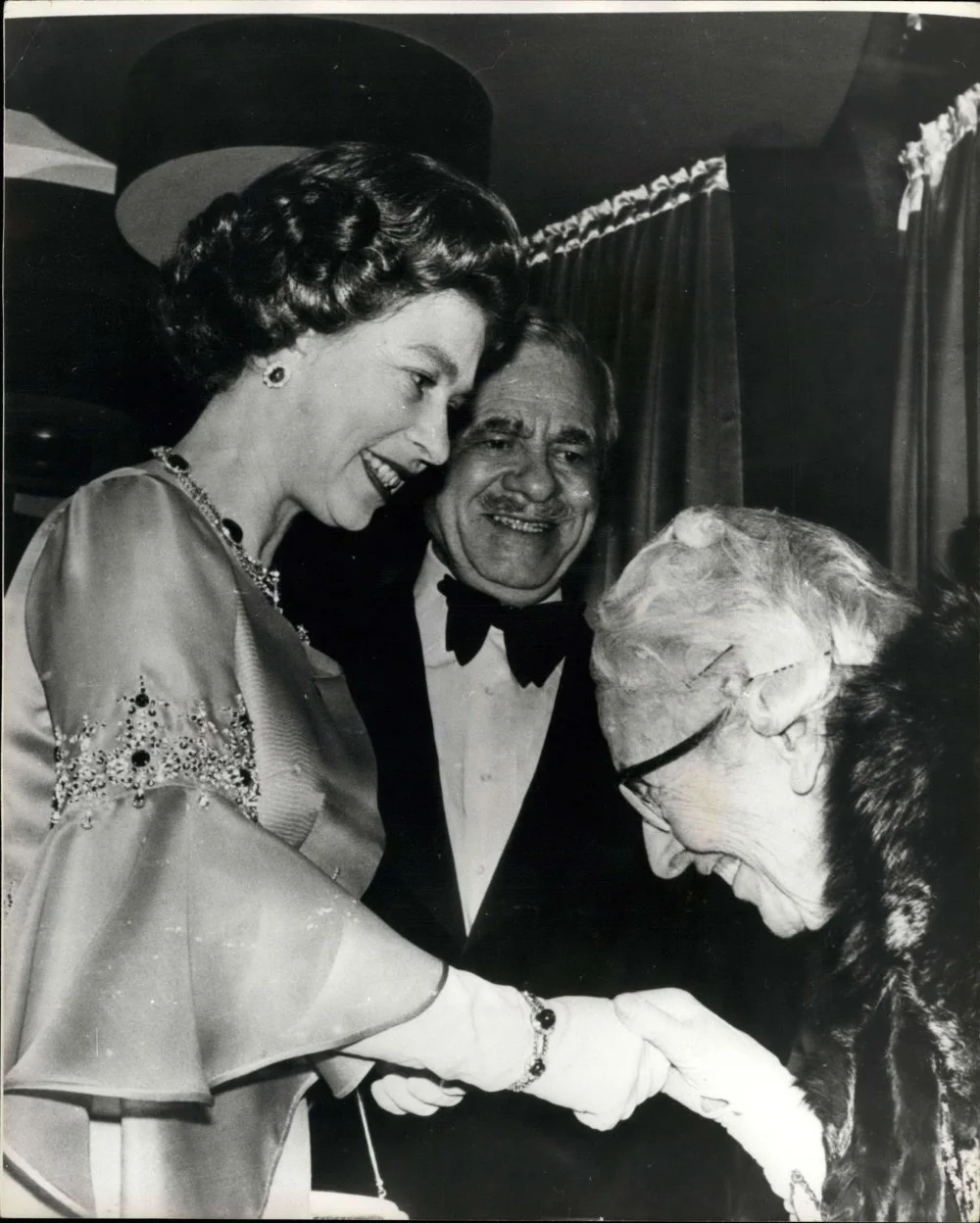
Queen meets Agatha Christie at Film Premier. 1974/Alamy
In the one there is repose, ease for nerves, time for reading, knitting, embroidery, and the pleasure of growing things. In the other theaters, art galleries, good concerts, and seeing friends you would otherwise seldom see. I am happy to say that I can enjoy almost everything.’
On Being a Writer
‘… but then there always has to be a lapse of time after the accomplishment of a piece of creative work before you can in any way evaluate it.
You start into it, inflamed by an idea, full of hope, full indeed of confidence (about the only times in my life when I have been full of confidence). If you are properly modest, you will never write at all, so there had to be one delicious moment when you have thought of something, know just how you are going to write it, rush for a pencil, and start in an exercise book buoyed up with exaltation.
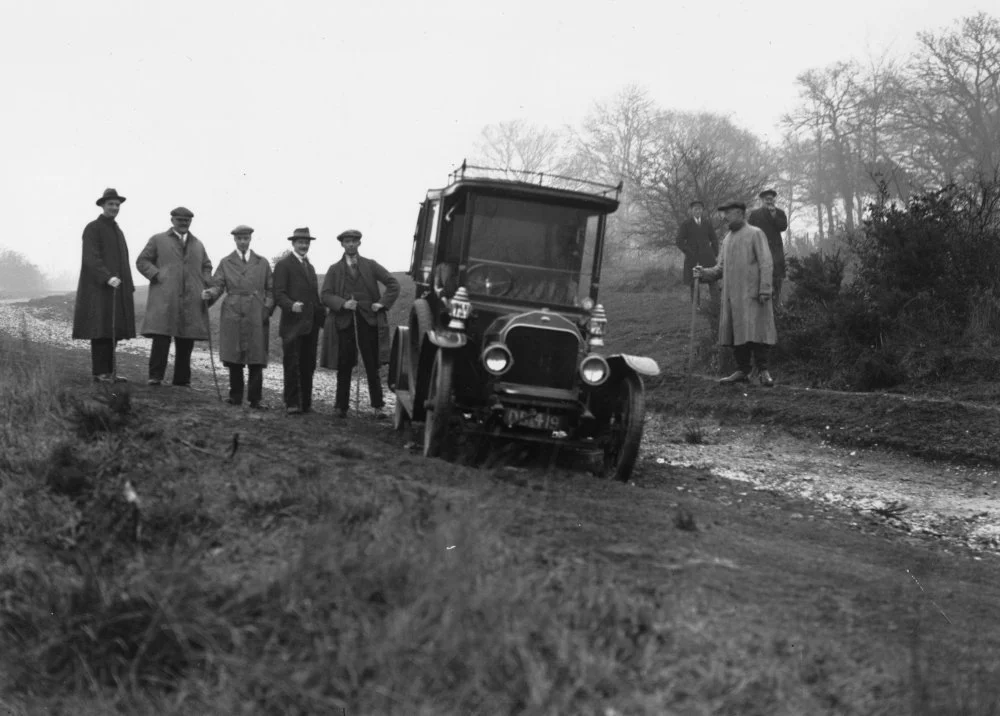
Agatha Christie's abandoned car, found on a hillside after her disappearance/Getty Images
You then get into difficulties, don’t see your way out, and finally manage to accomplish more or less what you first meant to accomplish, though losing confidence all the time. Having finished it, you know that it is absolutely rotten. A couple of months later you wonder whether it may not be all right after all.’
On Literary Technique
‘The only thing I will advance as criticism is the fact that the would-be writer has not taken any account of the market for his wares. It is no good writing a novel of 30,000 words—that is not a length which is easily publishable at present. “Oh,” replies the author, “but this book has got to be that length.” Well, that is probably all right if you’re a genius, but you are more likely to be a tradesman. You have got something you feel you can do well and that you enjoy doing well, and you want to sell it well. If so, you must give it the dimensions and the appearance that is wanted. If you were a carpenter, it would be no good making a chair, the seat of which was five feet up from the floor. It wouldn’t be what anyone wanted to sit on.
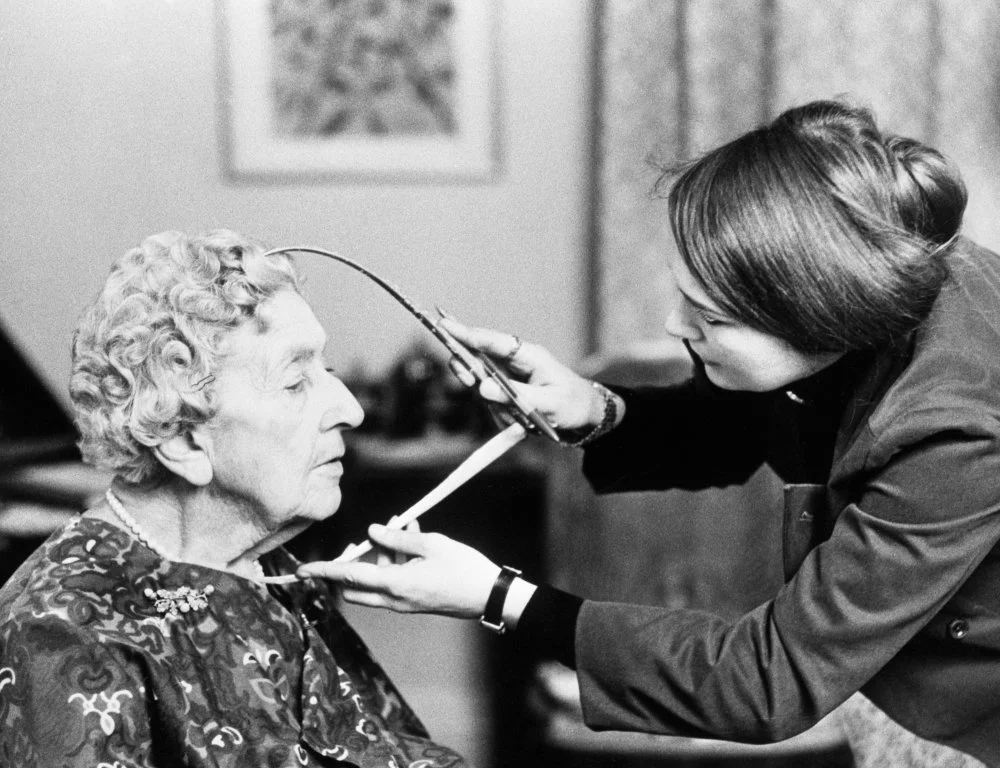
Employee takes measurements of agatha christie to make her wax figure/Getty Images
It is no good saying that you think the chair looks handsome that way. If you want to write a book, study what sizes books are, and write within the limits of that size. If you want to write a certain type of short story for a certain type of magazine you have to make it the length, and it has to be the type of story, that is printed in that magazine. If you like to write for yourself only, that is a different matter—you can make it any length, and write it in any way you wish; but then you will probably have to be content with the pleasure alone of having written it. It’s no good starting out by thinking one is a heaven-born genius—some people are, but very few. No, one is a tradesman—a tradesman in a good honest trade. You must learn the technical skills, and then, within that trade, you can apply your own creative ideas; but you must submit to the discipline of form.’
On Playwriting
‘Plays are much easier to write than books, because you can see them in your mind’s eye, you are not hampered with all that description which clogs you so terribly in a book and stops you getting on with what’s happening. The circumscribed limits of the stage simplifies things for you. You don’t have to follow the heroine up and down the stairs, or out to the tennis lawn and back, thinking thoughts that have to be described. You have only what can be seen and heard and done to deal with. Looking and listening and feeling is what you have to deal with.’
On Travel
‘Your travel life has the essence of a dream. It is something outside the normal, yet you are in it. It is peopled with characters you have never seen before and in all probability will never see again.
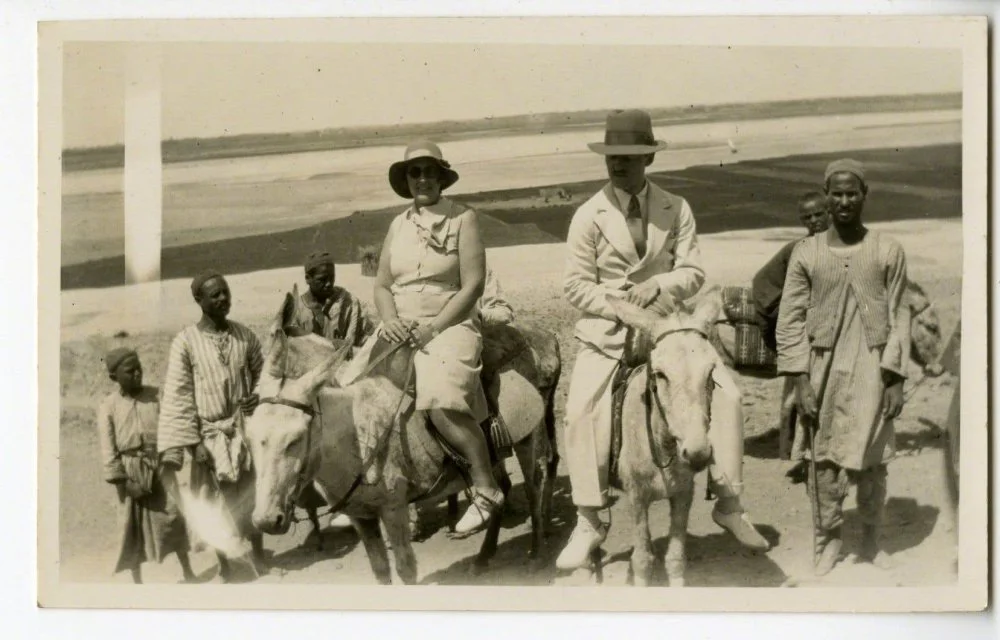
Photo tirée de l'exposition «Sur les traces d'Agatha Christie» présentée au musée Pointe-à-Callière/The Christie Archive
It brings occasional homesickness, and loneliness, and pangs of longing to see some dearly loved person. But you are like the Vikings or the Master Mariners of the Elizabethan age, who have gone into the world of adventure, and home is not home until you return.’
On Individuality
‘We are all the same people as we were at three, six, ten or twenty years old. More noticeably so, perhaps, at six or seven, because we were not pretending so much then, whereas at twenty we put on a show of being someone else, of being in the mode of the moment.
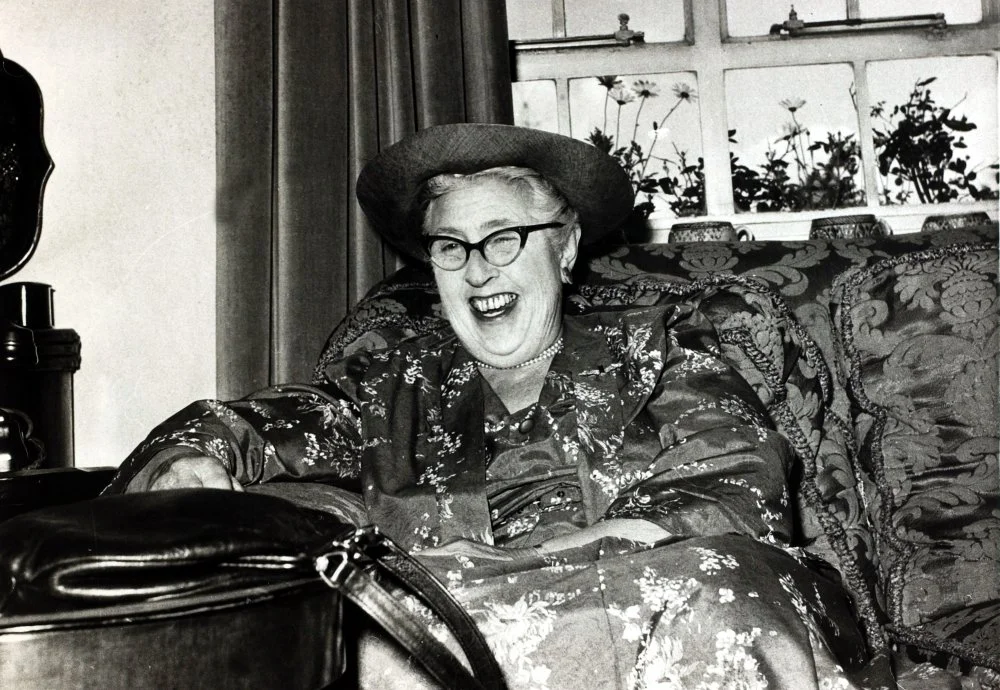
Writer Agatha Christie in jovial mood/Getty Images
If there is an intellectual fashion, you become an intellectual; if girls are fluffy and frivolous, you are fluffy and frivolous. As life goes on, however, it becomes tiring to keep up the character you invented for yourself, and so you relapse into individuality and become more like yourself every day. This is sometimes disconcerting for those around you, but a great relief to the person concerned.’
On War
‘… But one is left with the horrible feeling now that war settles nothing; that to win a war is as disastrous as to lose one! War, I think, has had its time and place; when, unless you were warlike, you would not live to perpetuate your species—you would die out. To be meek, to be gentle, to give in easily, would spell disaster; war was a necessity then, because either you or the others would perish. Like a bird or animal, you had to fight for your territory. War brought you slaves, land, food, women—the things you needed to survive. But now we have got to learn to avoid war, not because of our nicer natures or our dislike of hurting others, but because war is not profitable, we shall not survive war, but shall, as well as our adversaries, be destroyed by war. The time of the tigers is over; now, no doubt, we shall have the time of the rogues and the charlatans, of the thieves, the robbers and pickpockets; but that is better — it is a stage on the upward way.
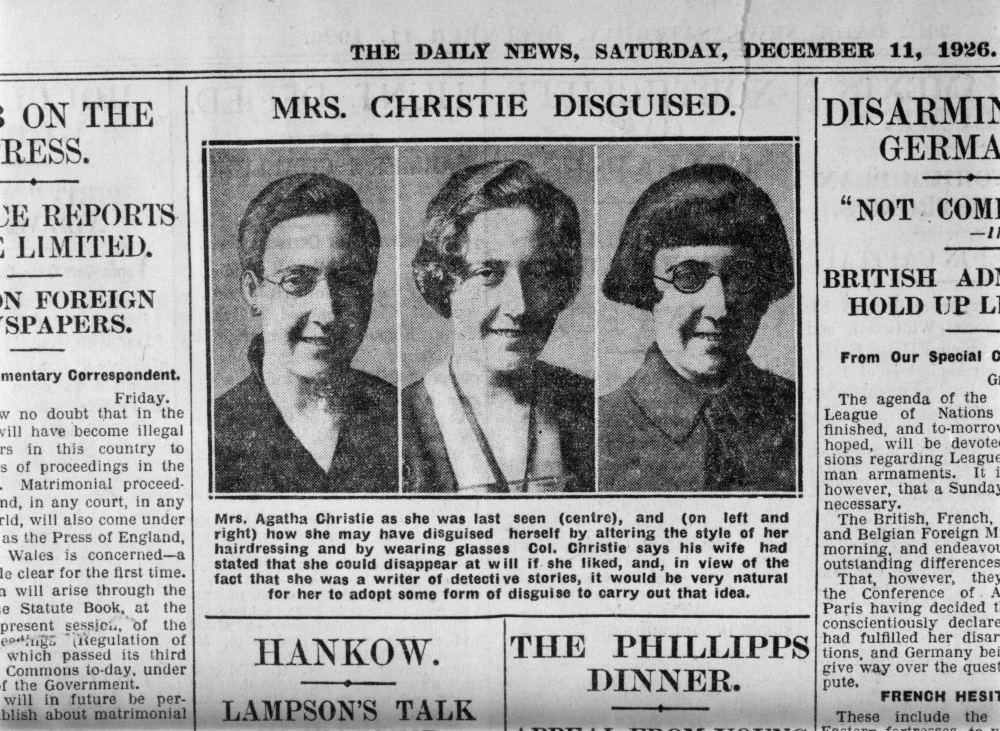
The " The Daily News " showing how she may have disguised herself after her disappearance. 1926/Getty Images
There is at least the dawn, I believe, of a kind of good will. We mind when we hear of earthquakes, of spectacular disasters to the human race. We want to help. That is a real achievement; which I think must lead somewhere. Not quickly—nothing happens quickly—but at any rate we can hope.’
What to read
Christie, Agatha. An Autobiography. London: William Morrow, 2012.